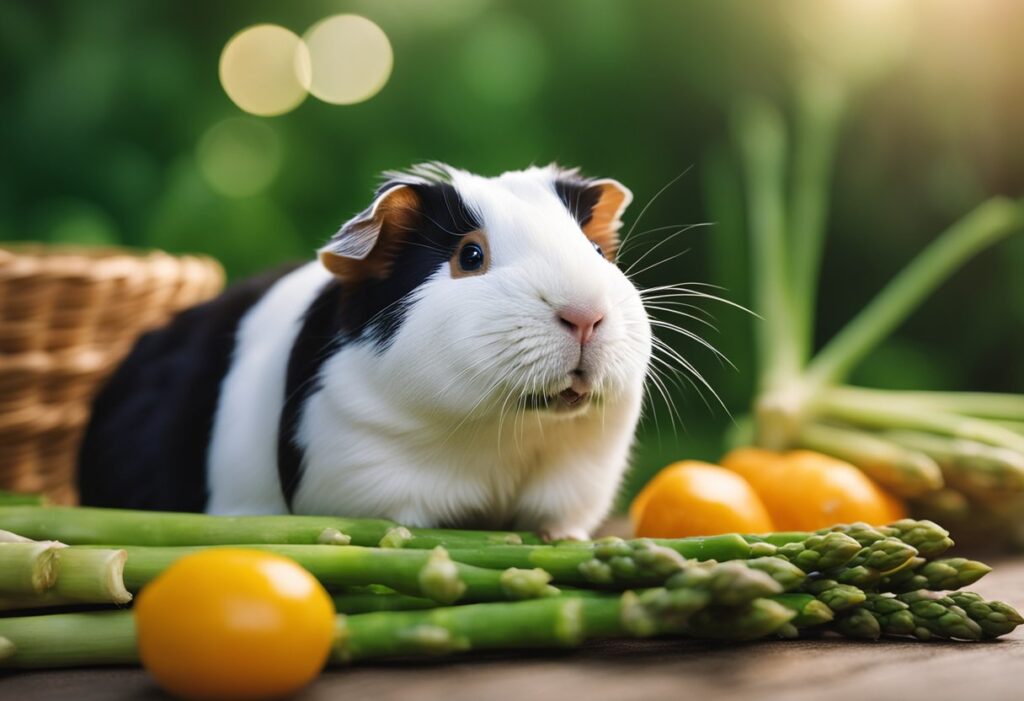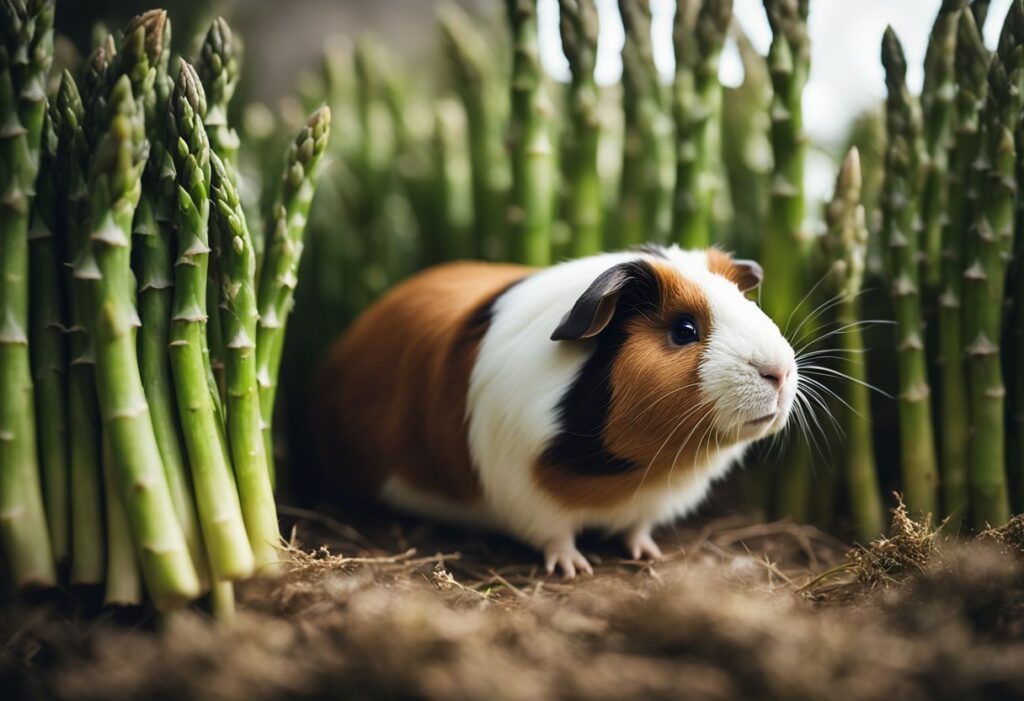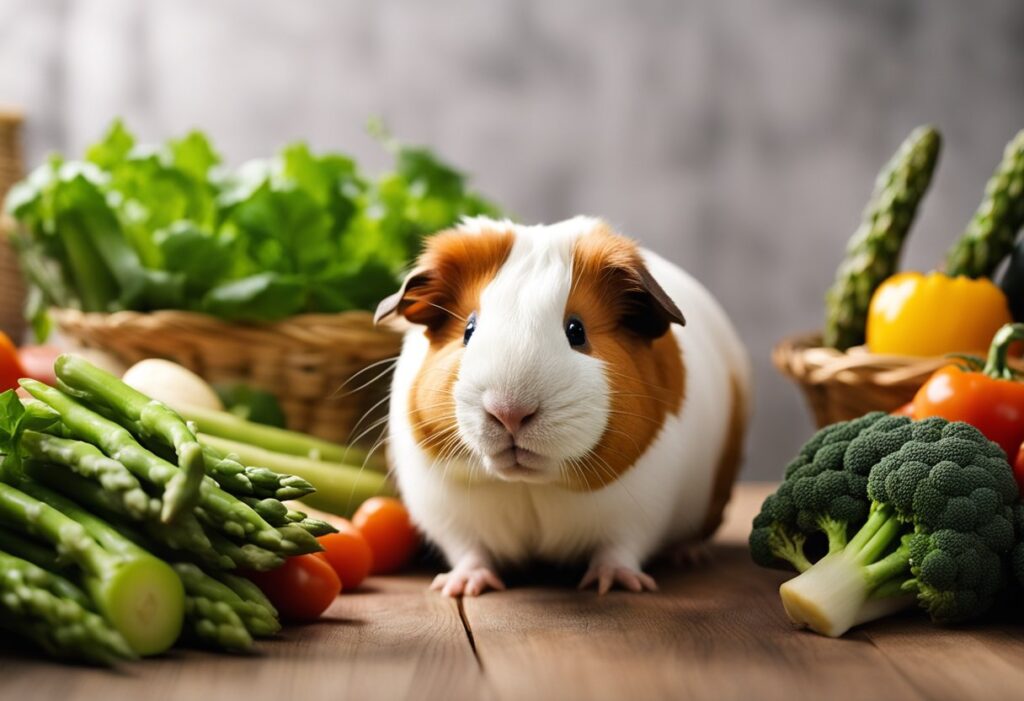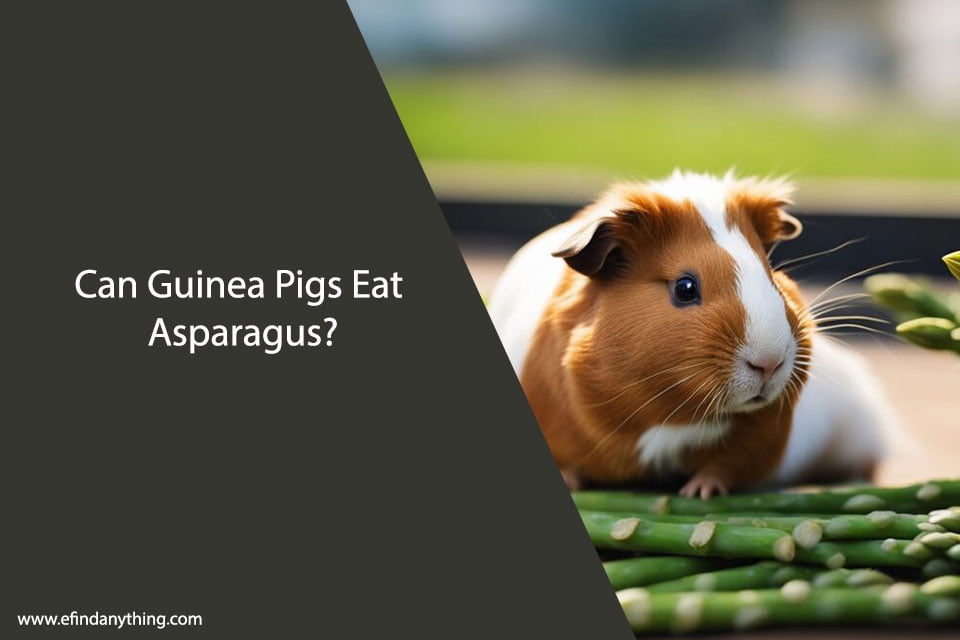As pet owners, we want to ensure that our furry companions are getting the proper nutrition they need to stay healthy and happy. Guinea pigs, in particular, have specific dietary needs that must be met to prevent health issues. One question that often arises is whether or not guinea pigs can eat asparagus.

The short answer is yes, guinea pigs can eat asparagus. Asparagus is a nutritious vegetable that can provide guinea pigs with essential vitamins and minerals. However, it is important to note that asparagus should be given to guinea pigs in moderation, as too much can cause digestive issues.
When introducing new foods to your guinea pig’s diet, it is important to do so gradually and in small amounts. This allows their digestive system to adjust and prevents any potential health problems. Asparagus can be a healthy addition to your guinea pig’s diet, but it should not be the main source of their nutrition.
Table of Contents
Nutritional Benefits of Asparagus for Guinea Pigs

Asparagus is a nutritious vegetable that can be a healthy addition to your guinea pig’s diet. Here are some of the nutritional benefits of asparagus for guinea pigs:
High in Fiber
Asparagus is high in fiber, which is essential for maintaining good digestive health in guinea pigs. Fiber helps keep the digestive system functioning properly and can prevent constipation and other digestive issues.
Rich in Vitamins and Minerals
Asparagus is also rich in vitamins and minerals that are important for guinea pig health. It contains vitamin C, which is essential for guinea pigs as they cannot produce it themselves. Asparagus also contains vitamin K, which is important for blood clotting, and folate, which is important for cell growth and development. Additionally, asparagus is a good source of potassium, which is important for maintaining healthy blood pressure levels.
Low in Calories
Asparagus is a low-calorie vegetable, which makes it a great choice for guinea pigs who are prone to obesity. It can be a healthy snack option that won’t contribute to weight gain.
How to Feed Asparagus to Guinea Pigs
When feeding asparagus to guinea pigs, it’s important to wash it thoroughly and cut it into small pieces. Guinea pigs should only be given a small amount of asparagus at a time, as too much can cause digestive issues. As with any new food, it’s important to introduce asparagus gradually and monitor your guinea pig for any signs of discomfort or digestive issues.
Overall, asparagus can be a healthy addition to your guinea pig’s diet when fed in moderation. It’s important to remember that guinea pigs have specific dietary needs, and asparagus should not be the only vegetable they are offered. A varied diet that includes a range of vegetables and hay is essential for maintaining good guinea pig health.
Risks of Feeding Asparagus to Guinea Pigs

Asparagus is a popular vegetable among humans due to its numerous health benefits. However, when it comes to feeding asparagus to guinea pigs, there are a few risks to consider. In this section, we will discuss the potential risks of feeding asparagus to guinea pigs.
Oxalic Acid Content
One of the main concerns with feeding asparagus to guinea pigs is its high oxalic acid content. Oxalic acid can bind with calcium, which can lead to the formation of bladder stones or urinary tract infections in guinea pigs. Therefore, it is recommended to limit the amount of asparagus given to guinea pigs and to avoid feeding it to guinea pigs with a history of urinary tract issues.
Gas and Digestive Issues
Another risk of feeding asparagus to guinea pigs is the potential for gas and digestive issues. Asparagus contains a high amount of fiber, which can be difficult for guinea pigs to digest. This can lead to bloating, gas, and other digestive problems. Additionally, feeding too much asparagus can cause diarrhea in guinea pigs.
Choking Hazards
Lastly, asparagus can pose a choking hazard to guinea pigs. Guinea pigs have small mouths and teeth, and asparagus can easily get stuck in their throat. Therefore, it is important to cut asparagus into small pieces before feeding it to guinea pigs.
In conclusion, while asparagus can be a healthy addition to a human diet, it is important to consider the potential risks when feeding it to guinea pigs. Limiting the amount of asparagus given, watching for digestive issues, and cutting it into small pieces can help minimize these risks.
Proper Serving Size and Frequency

When it comes to feeding asparagus to guinea pigs, it is important to keep in mind the proper serving size and frequency. Asparagus should be considered a treat and not a staple in their diet.
We recommend serving asparagus to your guinea pig in small amounts, about one or two times a week. A good rule of thumb is to offer a piece of asparagus that is about the size of your guinea pig’s eye. This will ensure that they are not overeating and receiving a balanced diet.
It is also important to note that asparagus should not be the only vegetable offered to your guinea pig. A variety of fresh vegetables should be included in their diet to ensure they are receiving all the necessary nutrients.
In addition, it is important to wash the asparagus thoroughly before serving it to your guinea pig. This will remove any dirt or pesticides that may be present on the vegetable.
Overall, asparagus can be a healthy and tasty treat for your guinea pig when served in moderation and in combination with other fresh vegetables.
How to Prepare Asparagus for Guinea Pigs

Asparagus is a healthy and tasty treat that guinea pigs can enjoy in moderation. However, before serving it to your furry friend, it’s important to properly prepare it. Here’s how:
Washing and Cleaning
Before serving asparagus to your guinea pig, it’s essential to wash it thoroughly to remove any dirt, pesticides, or other contaminants. We recommend using a vegetable brush to scrub the asparagus under cold running water. If you’re unsure if the asparagus is safe for your guinea pig, it’s best to err on the side of caution and avoid feeding it altogether.
Cutting and Serving
Once the asparagus is clean, it’s time to prepare it for your guinea pig. We recommend cutting the asparagus into small pieces to make it easier for your guinea pig to eat. You can serve it raw or cooked, but we recommend steaming it for a few minutes to make it easier to digest. Cooked asparagus also tends to be less fibrous and easier for guinea pigs to chew.
Raw vs Cooked
While guinea pigs can eat raw asparagus, it’s important to note that it can be tough and difficult to digest. Cooking the asparagus can help break down the tough fibers and make it easier for your guinea pig to eat and digest. However, overcooking can cause the asparagus to lose some of its nutritional value, so it’s important to steam it for only a few minutes until it’s tender but still crisp.
By following these simple steps, you can prepare asparagus safely and deliciously for your guinea pig to enjoy as a healthy treat.
Alternatives to Asparagus in a Guinea Pig’s Diet

Guinea pigs are herbivores and require a diet that is rich in fiber, vitamins, and minerals. While asparagus can be a healthy treat for guinea pigs, it should not be their primary source of nutrition. In this section, we will explore some safe alternatives to asparagus that can be included in a guinea pig’s diet.
Safe Vegetables and Fruits
There are several vegetables and fruits that are safe for guinea pigs to eat. These include:
- Bell peppers: A great source of vitamin C, bell peppers come in a variety of colors and can be fed raw or cooked.
- Carrots: High in vitamin A, carrots can be fed raw or cooked.
- Cucumbers: A refreshing and hydrating snack for guinea pigs, cucumbers can be fed with the skin on or off.
- Leafy greens: Guinea pigs love leafy greens such as kale, spinach, and parsley. These are a great source of fiber and vitamins.
It is important to introduce new foods slowly to guinea pigs, as sudden changes in their diet can cause digestive upset. Always wash fruits and vegetables thoroughly before feeding them to your guinea pig.
Commercial Guinea Pig Foods
In addition to fresh fruits and vegetables, there are also commercial guinea pig foods available. These foods are designed to provide a balanced diet for guinea pigs and can be a convenient option for busy owners. Look for foods that are high in fiber and contain a variety of vitamins and minerals.
When choosing a commercial guinea pig food, be sure to read the ingredients list carefully. Avoid foods that contain added sugars or artificial colors and flavors. It is also important to provide fresh water at all times and to monitor your guinea pig’s weight to ensure they are maintaining a healthy body condition.
Overall, there are many safe and healthy alternatives to asparagus that can be included in a guinea pig’s diet. By providing a varied diet that is rich in fiber and nutrients, you can help ensure that your guinea pig stays happy and healthy.





